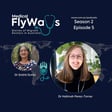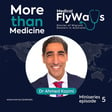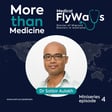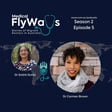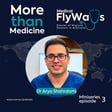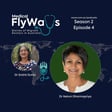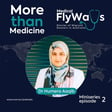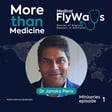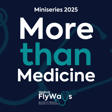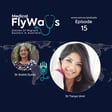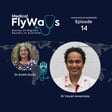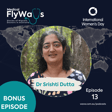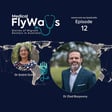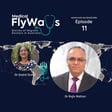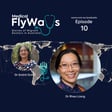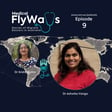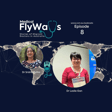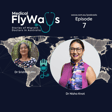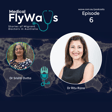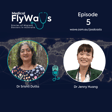Become a Creator today!Start creating today - Share your story with the world!
Start for free
00:00:00
00:00:01

Episode 16 - Dr Ushma Narsai
Dr Ushma Narsai is a highly experienced General Practitioner with over two decades in the field, having practiced in both South Africa and Australia. Holding qualifications including MBBCh and FRACGP, she is also a Senior Medical Adviser at Avant and a valued GP in Sydney. Dr Narsai has a strong clinical research background and a particular interest in adolescent health, women's health, and mental health. Known for her warm and friendly approach, she brings a wealth of knowledge and a compassionate perspective to her work in general practice and clinical advisory roles.
Recommended
Transcript
Introduction: Medical Flyways
00:00:01
Speaker
Medical Flyways, the untold journeys of migrant doctors in Australia.
00:00:13
Speaker
Hello again to my listeners and thank you so much for being with me. Today we have with us Dr Ushma Narsai. Ushma is a GP in New South Wales who has worked in both South Africa and Australia and in addition is currently what some would call a portfolio GP with many feathers in her hat, including being a medical advisor, claims manager, clinical editor and a clinical research investigator.
00:00:39
Speaker
Welcome, Ushma. Thank you, Srishti. Thank you so much for having me on your podcast. I've listened to quite a few of the episodes and must say that I love them. You're doing an awesome job.
00:00:50
Speaker
ah Thank you so much, Ushma. And I should say that I obviously have a shared area or experience with you, which is we have both been on the RACGP's Future Leaders Program, albeit a few years apart from what I can remember.
00:01:05
Speaker
So do you mind sharing a little bit of your Future Leaders journey?
RACGP Future Leaders Program
00:01:09
Speaker
Yeah, so I was in the first cohort when Future Leaders first started and it was an amazing experience. um It gave me a lot of confidence and I think that probably did play a ah big part in me going forward with some of my roles.
00:01:26
Speaker
I was fortunate enough to have an amazing mentor who was one of our previous RACGP presidents and I think that the through that mentor-mentee relationship, it does change you, it develops you, it does give you confidence, and it teaches you leadership skills, which I think as GPs or as doctors, we do inherently have, though we don't think about our skills as leadership skills, we we are leaders in in our industry. So,
00:02:00
Speaker
The leadership program, I suppose, just solidified some of the things that you already knew, but you didn't quite know how to use those experiences as a doctor in other areas or in leadership areas. So it was an incredible experience for me as Srishti.
00:02:18
Speaker
Amazing. And yeah, as you know, this ah podcast is the out output or outcome of my future leader's journey. So yeah, it's I do agree with you. It has had a fairly transformational effect on my self-leadership is where I would put it, most of all.
00:02:34
Speaker
So I know that you've actually worked in more
Journey from South Africa to Australia
00:02:37
Speaker
than one country. And I'm just wondering if we go back to the start of your journey, what was happening then and how did you come to be in Australia?
00:02:47
Speaker
Yeah, great question. So I was born and raised in South Africa. My whole family grew up there. So that's who I was and who I am.
00:02:59
Speaker
i did my medical degree in South Africa and I qualified, oh gosh, now many, many years ago. But after getting my medical degree, I did my internship back there.
00:03:10
Speaker
ah In South Africa, we did a year of what we call community service, which is an extra year of hospital practice. And after that, I went straight into general practice.
00:03:20
Speaker
I didn't do any further training in hospital general practice. I did there for nine years. I was fortunate to have been in a practice that wasn't traditional to start with.
00:03:32
Speaker
The doctor who owned the practice was amazing. He had a good vision for what he wanted his practice to be. And so we did the traditional general practice back there, but we also did clinical trials, pharmaceutical clinical trials, and we ran a diabetic clinic.
00:03:49
Speaker
So there were quite a few different things that we did there and that sort of gave me a little bit of an insight into but things that one can do as a GP that are outside of the normal, usual, general practice.
00:04:05
Speaker
So, yeah, having done that for nine years back in South Africa, we my husband and I then made the decision to explore another part of the world. Part of that decision, or I should say the the biggest part of that decision, to be honest, was a crime in South Africa.
00:04:24
Speaker
We'd had way too many experiences with crime personally, and we needed change. And so we made the incredibly difficult decision to move continents, move countries, leave family behind, leave everything that we knew behind and make a new start. And Australia wasn't our first choice, to be honest, but Australia, particularly the Australian Medical Council and APRA were very, very helpful in my journey. They were very coming with information.
00:04:56
Speaker
They were help very helpful in in helping me navigate what I needed to do because as you may imagine and all ah your listeners will imagine, we've all gone through that process or hoping to go through that process.
00:05:09
Speaker
It's difficult to navigate and it's challenging and it's hard to do that with all the emotions that go with making the decision of leaving home behind. Very true. hey I mean, I'm not sure we talk enough about the emotions that go with the move. And I'm part of a Facebook group where someone specifically asked about
Emotional Challenges of Migration
00:05:28
Speaker
that.
00:05:28
Speaker
And I guess my question to you is how have you found either being able to reconcile those emotions or go through them in terms of the time that you've now been away or have made your new home, I suppose is how I would put it.
00:05:42
Speaker
Yeah, no, it's a good question. And I'm just reflecting on that question. How did you reconcile or how did you manage that? But and I'm not sure that I have reconciled it. I think I've accepted the decision.
00:05:59
Speaker
my husband and I made that decision about almost 13 years ago now. and at the time, it was the right decision for us and I still do believe it it is the right decision that we made.
00:06:11
Speaker
Australia has been amazing. it's since Since being here, I've been afforded many, many opportunities that I'm not sure i would have explored if I was back home in South Africa. so I think we've accepted that we made the decision a long time ago, but we've also accepted that as time goes on, that it does become more difficult for some people. And I'm one of those people.
00:06:33
Speaker
I've got a lot of friends that say the longer you're away, you know, the easier it gets. But I think my husband and my experience has been that the longer we're away, the harder it becomes because... We aging, parents are aging, our families are aging, you're missing big, you know, family events, new babies, weddings.
00:06:50
Speaker
And as each one happens, you think, oh gosh, I'm not there for that. But there's still a positive at the end of it. You know, we walk outside, we ah we go to work, you know, relaxed, you're not looking over your shoulder.
00:07:05
Speaker
And coming back to... korea it's been and amazing, incredible journey for me, just, you know, with my different roles that I have had. And I i suppose being here in Australia, I put it down to Australia.
00:07:21
Speaker
So I'm very thankful and grateful for that. I mean, i I wonder if there's some elements of how you've approached it that might have helped too. So if I was to ask you, what were the three things that you think helped you or were assets from your point of view in terms of navigating that? And that's mainly to share with those people that are close to making the decision, but are not sure if they are ready.
00:07:44
Speaker
What were the things that that you as a person might have felt would be helpful for them at that point? I think the number one thing is support, family support, particularly. My husband's my biggest fan, I believe.
00:07:57
Speaker
And my family were very supportive in our decision to move out of South Africa. So I think that was the biggest thing. I don't think I could have done this with any of that. And until today, my husband is the one that pushes me forward, pushes me to even do a podcast like this because I'm not ah very outspoken person. So I think that's number one.
00:08:19
Speaker
Number two is, I think, a persistence process. I feel that we often put ourselves in little boxes and we say, well, I'm a GP, that's all I can do. No, our skills are very transferable and every single thing we do in practice can be transferred to a different role and persisting. So even that first step of moving to a new country, you know, if what you're reading doesn't make sense to you, make connections on social media, LinkedIn, there's a lot of avenues.
00:08:49
Speaker
ah Like I said earlier, For me, just the simple thing of reaching out personally to the Australian Medical Council, to APRA, forming a personal relationship with someone on that end made all the difference because I had someone that I could bounce things off of and ask, was I on the right right track? What were my options?
00:09:10
Speaker
Maybe my experience was unusual, but I think it was persistence that played a role in me getting the answers that I needed. And I think the third thing is being open, being open to new things, to new ideas and being open and excited for a new chapter in your life. And I think if you don't have that, then you've got to think about whether this is the right time for you to be making the move. Whereas I think if you are excited, you're looking forward to starting a new adventure, then that whole journey is a little bit different and positive.
00:09:44
Speaker
I think I remember coming over and a friend of mine who listens to these had come with me. We'd gone to the UK together and then she'd been in Australia before me. So we used to talk about making new memories together.
00:09:58
Speaker
so you know, there's all these little things that you add up to that positivity. doesn't all have to come from you yourself as well, right?
Career Transition in Australia
00:10:05
Speaker
So what do you feel was, you know, the opportunities that you've spoken to, as in obviously not just have they come, but you've taken them up is how I would frame it.
00:10:15
Speaker
How have you assessed from that point when you came as a GP with additional skills, from what I've heard? What were the ones you picked? What were the ones you didn't pick? Or how did you make that choice?
00:10:28
Speaker
Yeah, so when we first came to Australia, I wasn't registered with APRA yet. So I was still going through the Medical Council exams, the AMC exams.
00:10:41
Speaker
And so my husband got a job here. And that was, oh gosh, it was a godsend because I think that that just made that whole journey start a little bit earlier. So we came here on his account and that gave me a little bit of freedom to take my time with the exams. and Once that was done, i had to go through that process of applying to R Prime as you mentioned. imagine and all the listeners imagine, that's a long process. It doesn't just happen instantly.
00:11:10
Speaker
So in that time of waiting for all of that to happen, we had a friend, one of my husband's colleagues, actually his wife, who reached out to me and she said that they've got a really small position at a company called International SOS and it It was a role where I was going to be sitting in an office in a call center and I was going to be calling practices and asking them to forward us the insurance paperwork that we required for people's claims.
00:11:38
Speaker
So it was a call center role. And I think that for listeners, I think that that's something i can't stress enough that sometimes people You have to be open to doing things that are completely outside of what you expected.
00:11:53
Speaker
We're not going to get the positions that are high up there at the get-go or not always. It's not always going to happen. And so I started as a call center person ah while I was waiting for my APRA registration.
00:12:06
Speaker
your proverbial foot in the door. Exactly. And that opened ah foot in the door. It opened the next door, which was a coordinating doctor for international SOS.
00:12:18
Speaker
And I did that for a short period of time, again, while I was waiting for APRA registration. And that was opportune because, you know, for me, I do believe that if I hadn't taken that first step, if I had thought, okay, call center role I can't do, I'm a GP, how can I do a call center role?
00:12:34
Speaker
I wouldn't have had that next step, right? And that next step was, ah again, a door. It was as a doctor working still in a call center type of role, but doing medicine. i was lucky that it was an international company.
00:12:46
Speaker
So, you know, we worked with doctors from all over the world, so that helped. But that was something for me to gain experience with, to teach myself that I can do things outside of traditional medicine.
00:13:00
Speaker
And then I got APRA registration. So for me, my focus was to get my APRA registration. And I did want to do general practice. That was always my passion. So that's how I ended up in doing general practice. And I did that for a while before then i branched out.
00:13:16
Speaker
And did more things. and Yeah. yeah So, and it sounds like learning is quite a big part of your journey and you value it quite highly from what you've said so far. What do you think were the, you know, three main skills or and I doubt that I'd say learn them, but what were the things that you needed, new things that you did you needed to learn when moving over as an adjunct or a refinement of what you already knew?
00:13:44
Speaker
Yeah. Yeah, so I think the first thing that I had to learn and develop was my own confidence. Having worked in general practice for nine years in South Africa, I worked for someone.
00:13:58
Speaker
I believed that's all I could do. I believed my skills were only in general practice. So it was the confidence to believe in myself that I could do something else. And we Where that came was when I had to do these blind calls to practices and beg them to give me reports that I know companies like that had done for me when I was in practice.
00:14:20
Speaker
So I think that confidence was the one big thing. i think the other things that I learned very quickly in Australia was confidence. and a pleasant surprise, the one was that people here see you for who you are They don't care where you come from. Well, that's been my experience. They don't care how much money you make, what car you drive, what you're wearing.
00:14:42
Speaker
You are just who you are. And so that then gave me that freedom to say, well, if I am taken for who I am, I can actually be anything that I want to be. And that doesn't have to be a traditional general practitioner.
00:14:55
Speaker
The third thing was exactly what I mentioned earlier about the transferable skills. When I took on that early role with International SOS, I had to really think hard about now, how am i going to approach this interview to make them understand that I can do this job?
00:15:15
Speaker
And I remember my manager at that time who said to me, you know, why do you keep saying you don't have the skills to make a phone call to practice? Why do you say you don't have the skills to use the IT systems that we use?
00:15:29
Speaker
You do this in practice. You communicate with patients. You communicate with their families. You communicate with fellow colleagues. You communicate with private health insurers. So communication is already in your forte of experience. So why say you can't do it?
00:15:45
Speaker
You can do it. And the same goes with IT. So, you know, I mean, I'm not IT savvy at all, but you can learn. If you're open to it, you can learn. And, you know, it's a different country, different systems.
00:15:56
Speaker
If you're open to learning it and making it a success for yourself and using it to your advantage, you can learn it. So i think it's about learning that. Our skills are transferable. That was the third thing.
00:16:09
Speaker
You said you mentioned about the, you know, I think you've referenced two things already, which are worth signposting is, which is one is moving to another country or continent. And the second was doing that thing that you've never done before, which is pick up the phone call and make that phone call.
00:16:26
Speaker
I mean, I think it there's, ah there's like, sounds to me like there's an element of courage and confidence in there. you know Yes, the confidence comes from knowing you can do it, but there's still that level of slight discomfort of you've never done it before.
00:16:39
Speaker
So what do you think gets you past the line? like I think for me, I'm just a stubborn person. I like to challenge myself. If there's something that I know that I'm very uncomfortable, I want to do it more.
00:16:53
Speaker
I was fortunate enough to be on a panel at Wonka last year. And when I was asked to do it by my current job event, my first instinct was, no, no, no, I can't. I don't like public speaking. I hate it. I'm not doing it.
00:17:08
Speaker
But a lot of people that know me will know that, yeah, as soon as I say that, no, it turns into, well, you're going to do this. You're going to do this. I don't care how uncomfortable it is. You're going to take this challenge on and you're going to do it.
00:17:23
Speaker
And so I think that's been me in the last 13 years. It's been me just challenging myself. I love it. I love proving to myself that I can do something that I don't think I can do.
00:17:34
Speaker
Awesome. I think growth over stability has certainly helped many people in their journey of challenging the unknown and not knowing where to go.
Current Roles and Skills
00:17:42
Speaker
Can I ask you about the current roles you're in? And one of which you just mentioned, which was with Avant.
00:17:47
Speaker
And I know that when I've read from your externally visible information, such as LinkedIn, there's a lot of shared, like lot of skills that you work use across many of these roles.
00:18:00
Speaker
What do you feel are the, you know, the top, top skills there that you'd consider yourself to be an expert at? I'm going to challenge you on that one. and So firstly, i don't I don't consider myself to be an expert in anything. I think we are all a work in progress. And I strongly believe that the day I think that I'm an expert in something is the day I'm going to fail at it because I think that we are always learning.
00:18:26
Speaker
But I think that across all three of my current jobs, the commonalities that make me successful in these jobs is firstly medical knowledge and being able to find information that you need, of course.
00:18:40
Speaker
And the second thing is communication, being able to articulate what you want to say both verbally and in in writing. So all three of my roles are very much communication based. With my role with event, I carry two hats. So I wear two hats. One is as a medical advisor and one is as a claims manager.
00:19:02
Speaker
And in both of those roles, you know, you're communicating all the time with fellow doctors, with lawyers, with claims managers, with regulators,
00:19:13
Speaker
In my role as investigator, you're communicating with fellow doctors who are working on clinical trials, you're communicating with your manager on site, with colleagues that work on trials called trial coordinators, working with people from the pharmaceutical industry for whom you are doing the clinical trials.
00:19:32
Speaker
And in my health pathways role, while it's not so much ah verbal communication, little bit amongst the team, it's more written, being able to write protocols quite clearly for health pathways so that colleagues are able to understand and follow what you've written.
00:19:49
Speaker
But there is an element of communication as well because we're talking with other specialists who are subject matter experts. So I think communication and the medicine, those are the two across the board with all three roles.
00:20:04
Speaker
In terms of what you learned through medical school, in terms of the communication skills, is what you're using now different from that or simply an extension of it? and extension I think that, you know, one of my earliest memories around communication at medical school was, I think it was as a fourth year student doing a ward round and the consultant took us to this bed of this patient who had metastatic breast cancer.
00:20:33
Speaker
And we had a general discussion and the consultant asked us a very simple question. And she said something along the lines of if a patient came to you and said they've got this breast lump that's been there for however long and you do an examination and there's no breast lump, would you take your examination as the end all and be all or would you look at the patient and think, well, what's actually brought them here? Is there something there that I'm not feeling or I'm not seeing?
00:21:02
Speaker
And that stuck with me because it made me realize that that communication, it's not all about our hands and what we're feeling It's not all about the investigations that we do. We know this in practice. It's about talking to that patient, getting those first steps of your history in building a rapport.
00:21:19
Speaker
And that really just, you know, like I said, it impacted me if I'm still thinking about it that many years later, that how important that communication is. And then later I, you know, I,
00:21:31
Speaker
As you go through different iterations of medicine, you know, as an intern, as a more senior doctor, then as a GP, then in your alternate roles, you just build on those communication skills. And i think part of that building is also your confidence.
00:21:49
Speaker
being able to maturely gauge your audience, being able to change how you communicate with different people. And I think as doctors, we are amazing at it. Every patient that walks in through our doors is different.
00:22:03
Speaker
We've got adapt our communication styles depending on the person in front of us. And I think it's no different to when you're working in a more non-traditional role. you know It's fascinating. I completely agree with you. you know It's interesting that one of the things we teach registrars early on in GP training is negotiating a agenda when the patient comes in. And if you think about your roles particularly, there's a fair bit of negotiation that goes on with many of those interactions that isn't classed as a negotiation, but often is.
00:22:34
Speaker
So with regards to, I'm listening to this, and in my mind I'm thinking, everything you said to me makes you sound like a medical educator. And I almost feel like, was that a missed calling? Was that one of those things you said no to along the way?
00:22:49
Speaker
but Was there a teacher in there somewhere that's not quite bloomed yet?
00:22:54
Speaker
It's so interesting you say that it's an area that I have explored over the years. I don't think I'll teach a material, but there, there's that doubt that's coming in, which is then going to translate in a few months to, well, actually.
00:23:09
Speaker
Maybe I am. Maybe I can do this. So who knows? We'll see where that takes me, Srishti Kippa. Yeah, because and that's the thing. I think you're right. We still always have something we have to say no to to do well at the things we're doing currently as well. Yeah.
00:23:24
Speaker
Yep. So there's always going to be something on the list we didn't do. You know, you have many hats. And I know the thing I get asked often is how do you manage to do it all? And how do you balance clinical versus non-clinical roles in your everyday life or just in your aspirations and actions?
00:23:41
Speaker
Yeah, it's challenging. I think for anybody that wants to do it, I think you've got to be accepting of the fact that it's tough.
00:23:51
Speaker
It looks all glamorous on the outside, but it's tough. And I think the biggest thing is that you, but you do have to want to do what you're doing if you are doing it because it's a job or you're doing it because you have to do it, it's going to be ah all the more difficult. So for me, i think what helps me, I've been doing the juggling for about probably seven, seven years now. And i have to almost,
00:24:20
Speaker
physically at the end of each day, reset my brain. So my roles are done on different days. I don't have like a chunk where I'm doing three days at a event and then three days at my research role and then two days at pathways.
00:24:35
Speaker
It's all scattered throughout my week. But with each day, so on an event day, when I end the day, I've got to in my brain, physically really hard, tell myself, well, event's done now, stop.
00:24:49
Speaker
tomorrow's research and so switch and I almost see it like a switch swiftif tea I feel like there's a switch that I switch and then at the end of my research day if the next day is event then I think you know well tomorrow's event you need to stop so you switch again and so that cognitive there is a cognitive burden on doing that and it's not for everybody so I think if you see someone else doing it then it's all very exciting and it's you know you feel like Like, want to do that. That looks cool. That looks amazing.
00:25:20
Speaker
is for that person, but it may not be the right thing for you. I've got a colleague that I work with at the moment and they say to me that that's not something that appeals to them at all. They don't like the thought that they've got to keep chopping and changing.
00:25:34
Speaker
it's not for everybody. Yeah. yeah the So the next logical question in my mind is, have you ever tried doing just the one role for the whole week? don't want to.
00:25:44
Speaker
ah right yeah I am so lucky, Sreefi. I consider myself very, very fortunate. um all three of my current roles, I love doing. I don't want to give any of them up. I love all of them. i have incredible people that I work with, which makes, I think it makes the job a lot easier. And I think when you know that you're going to be spending all that amount of time with people and if you choose your jobs carefully, i think that you...
00:26:15
Speaker
can make a success and people are push you along the way. I've got lots of fans in all of my jobs. My managers in both of my two big roles are very, some of my biggest fans and they nudge me along, you know, and that's important.
00:26:30
Speaker
That's awesome. I mean, you definitely need your allies and your um advisors and your mentors and your coaches all along the journey, as as as you will say. So we've spoken a fair bit around work and we also discussed that, you know, there's things you leave behind when you move to a new country.
Cultural Reflections and Family Absence
00:26:48
Speaker
So are there any new or were there any new, unusual or unique cultural or other experiences in Australia that you had that you hadn't considered and have enjoyed?
00:27:02
Speaker
South Africa and Australia are very similar in a lot of ways. The way there's a lot of like and generally culturally, you know, in ah in South Africa, we like barbecuing. We call it brine.
00:27:14
Speaker
We barbecue here. We like being outdoors in South Africa. We outdoors here. So culturally, I think there is a bit of a match. I think maybe that made it a little bit easier for us to move here.
00:27:25
Speaker
But I think what was a big culture change for me was what I alluded to earlier, that I felt always in South Africa that what you did career-wise defined who you were, whereas I don't feel that that is the way it is here.
00:27:42
Speaker
you know, with friends, with colleagues. My experience has been that they see you for you. You're the person. You are Ushma. That's what you are. You're not the doctor. You're not the GP. You're not the medical advisor, you know. So and that was a pleasant surprise for me.
00:27:57
Speaker
I think that When my husband and I came here until now, we don't have any family here. And I think that's a big culture shock because you come from South African Indian family back home where every weekend you're doing things with family.
00:28:14
Speaker
You're attending weddings, you're attending functions, you're attending prayer. meetings or whatever you want to call them. And then you come here and suddenly it's a lot more of a westernized way of living. And, you know, you have to learn where your culturally safe places are. So it's a big learning curve, but you find your way. You start slowly making friends. You start slowly meeting people who then introduce you to other people and your circle does grow bigger. So that helps.
00:28:44
Speaker
Yeah. But I think for me, that was the biggest culture shock was not having that social background that we had back in South Africa here. And I think part of the biggest part of it is not having family here.
00:28:57
Speaker
So I think for people that are looking to moving overseas, I think you do have to keep that. you know, at the forefront of your mind that it's not going to be the same. You know, eventually you may get family coming in, you'll get friends that become family, but you'll never have the exact same thing you've had back home. I don't believe so anyway.
00:29:17
Speaker
Now, I'm going to ask you three. Normally, when we're coming to the close of the session, we we bring up three words. And I normally say that and you give me whatever comes to your mind.
00:29:28
Speaker
So I'm going to ask you the three and we can see what comes to your mind.
Perception and Pride of IMGs
00:29:33
Speaker
So IMG. International medical graduate, I feel that generally as a group, we are a little bit looked down upon.
00:29:44
Speaker
We are seen as, oh, the IMGs, you know, they don't have appropriate training. They are trouble. i think that's the traditional way of looking at us. But I also, but flip side of it, when I think IMG, I am jail also think opportunity.
00:30:01
Speaker
We've taken a big step that a lot of people don't. And we've come to a new country. We've left everything behind and we've made successes of ourselves. And I just feel proud. So the word that comes to mind is proud.
00:30:14
Speaker
Awesome. Second, self-promotion. yeah Self-promotion is what comes to mind with self-promotion is this, Srishti, being open to when people send you invitations to be on their podcasts and having the confidence to sell yourself to say, well, I am a GP, but that means I can do a lot more than just medicine. so self-promotion is equal to confidence.
00:30:42
Speaker
Fantastic. And the third one is balance. Most important one. You have to have balance. And balance is about inside, in your head, but also physical balance.
Maintaining Life Balance
00:30:54
Speaker
You've got to be able to make time for your family.
00:30:57
Speaker
My husband and I spend a lot of time together. I spend a lot of time on the phone speaking to my sisters, my parents, you know, my mother-in-law, of extended family. You have to make that time. I think that's what nurtures you and that's what able, it's the juice that keeps you going.
00:31:12
Speaker
It's physical balance. So you've got to make time for exercise. I'm a gym freak. I love going to the gym and weightlifting. And that's a non-compromised, you know, if you ask me to do a meeting at a time when it's gym time, that's not happening. I'm doing my gym and that's it.
00:31:27
Speaker
and doing things for yourself. I think the balance of finding something that you love to do. I don't have any hobbies, to be honest. I've become a little bit of a Netflix slob. But if I had to choose something that I love doing, and this is a freak fact, is I love VR boxing. And I find it amazing fun and a good workout as well.
00:31:49
Speaker
Though I do look like a bit of a clown doing it. Awesome. And it doesn't bother you that you look like one is the best part of it and you can do it. So yeah, absolutely. Oh, which by it's been absolutely fantastic talking to you. And I'm sure that I feel like there needs to be a part two of this as well.
00:32:05
Speaker
As a parting thought, is there anything else you'd like to to share as your wisdom to people that may not yet be in Australia, but are considering it? ah My biggest words of wisdom is if you're thinking about it, you know, do your due diligence, research where you want to go talk to people who are already living there, but have confidence in yourself.
00:32:25
Speaker
Dreams are meant to come true. And, you know, what's the worst thing that will happen? You'll come, you don't like it, you go back home. So what? But everything that we experience in life is an experience that builds us.
00:32:36
Speaker
And living in a new country brings a lot of challenges, but it brings a lot of positivity. There's so much, you know, you learn about other cultures, you learn about other people and you do get opportunities and you you need to look for them.
00:32:51
Speaker
So be open to opportunities, be open to change and don't set limitations for yourself. Don't put yourself in a box. Beautifully put, dreams are meant to come true. So on that note, we will finish today, but look forward to seeing you again, Ushma. Thank you so much, Wishti, and I wish you all the best. Thanks for having me.
Closing and Acknowledgments
00:33:12
Speaker
Medical Flyways, we're always on the lookout for inspiring stories from migrant doctors in Australia. If you have a colleague whose stories need to be told, head to wave.com.au slash podcasts.
00:33:27
Speaker
Medical Flyways is recorded on terrible land in Meanjin, Brisbane. This podcast focuses on overseas doctors and their families finding a home in Australia.
00:33:39
Speaker
We acknowledge and thank the traditional custodians of country throughout Australia and recognise the continuing connection to lands, waters and community.
00:33:50
Speaker
We pay our respects to Aboriginal and Torres Strait Islander cultures and to Elders past, present and emerging.
